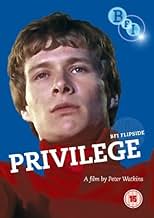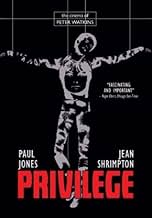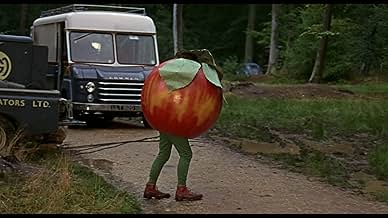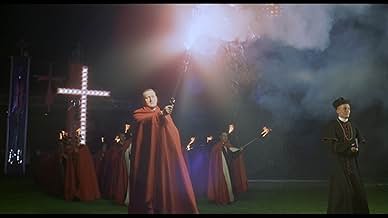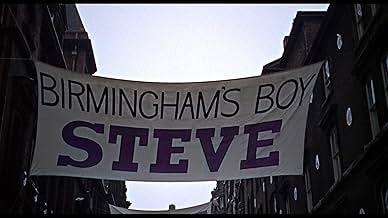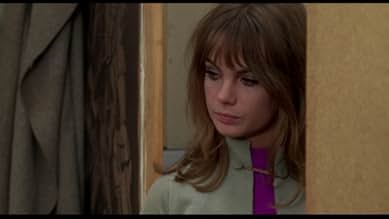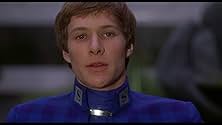Ajouter une intrigue dans votre langueBritain's biggest pop singer, Steven Shorter (Paul Jones), receives unwavering adulation and possesses total control over his rabid fans, which includes nearly the entire population. Yet Sho... Tout lireBritain's biggest pop singer, Steven Shorter (Paul Jones), receives unwavering adulation and possesses total control over his rabid fans, which includes nearly the entire population. Yet Shorter is not an autonomous performer -- he is little more than a puppet for the government,... Tout lireBritain's biggest pop singer, Steven Shorter (Paul Jones), receives unwavering adulation and possesses total control over his rabid fans, which includes nearly the entire population. Yet Shorter is not an autonomous performer -- he is little more than a puppet for the government, promoting whatever agenda they see fit. When a beautiful artist, Vanessa Ritchie (Jean Sh... Tout lire
- Réalisation
- Scénario
- Casting principal
- Récompenses
- 1 nomination au total
Avis à la une
The one major flaw of the film is Paul Jones' performance as the Singer Steve. He's just too dull and boring to be believed as the greatest Rock Star of All Time. Swinging 60s fashion icon Jean Shrimpton plays the girl who is hired to be with him. Patti Smith covered the title tune ("Set Me Free") on her great album, Easter.
Update: PRIVILEGE has finally made it to DVD and Blu Ray (but, not currently streaming)
Critics called this movie heavy handed and others called it paranoid. I say it's excellent and Mr. Watkins did a fantastic job directing this film. It's too bad this movie's virtually impossible to find. Oh well, if you ever happen to come across it don't even stop and pause. Watch it!
Highly recommended.
Factoid: A movie and audio clip from this movie can be found on the Big Audio Dynamite song and video "Just Play The Music"
This matters for several reasons. Firstly, because the film was as prescient as many consider Nostradamus to have been. Its plot, considered so far-fetched at the time that the film was oft labeled science fiction, centers around an increasingly totalitarian government in a first world country that attempts social engineering at all levels, including utilization of pop culture. It's hit on the formula to control youthful rebellion and dissent in general by investing a young pop idol with state-sponsored power (more in a minute) as centerpiece of national obsession. EVERYONE cares about this particular pop idol and what happens to him every week, since his act has been designed to attract universal sympathy and diffuse caring about one's self and one's own troubles. I'll not reveal how because the strange design of the first tour of his that viewers see is a revelation within itself.
What he says, what products he endorses, and how he steers the populace into state-sponsored trends and philosophies is a fait accompli in the film. The government notes a surplus of apple crops, idol Steven is immediately shown eating lots of apples, as now will the general populace. Got religion? Steven now does, and you will too. It always works. You buy what he wears, what he endorses. But what sort of personality would go along with being such a figurehead? And what sort of actor could even pull this messianic stardom off realistically, since the film is made in documentary style? Luckily, the answers are pretty good. The plot centers on the gradual breakdown of this personality, as no one but an insane megalomaniac could keep this up forever, his world of his every action micro-managed by others and every "creative" output predetermined for him. (Not like....now in 2008!) This person hired to quell all rebellion eventually starts to rebel against the state-sponsored "love." And the actor hired to be both this convincing a pop star and soul tormented practically to torpor was an actual rockgod, Paul Jones, the tall, good-looking blond singer of the Manfred Mann group of the mid-60's, if you recall the hearty voice on classic Brit oldies "Do Wah Diddy" and "Pretty Flamingo." "Privilege"'s director Peter Watkins, known for terrifying all of Britain with the first realistic, ultra-violent post nuclear apocalypse film "The War Game," knew how important casting is, despite trade-offs. Paul Jones was of the minute modern, and could convey this fantastical idea of Orwellian government control through a pop star by being a credible pop star known at the time. His co-star, 1960's icon Jean Shrimpton playing the instigation of the star's rebellion, was the most beautiful and famous model ever, at that particular moment in history. The trade-off was you believed them in their roles, even if you didn't believe them as trained actors.
It's not so much that they can't act, more that both leads were directed to be underplayed a la Garbo: you put your own reflections of the proceedings on their visages, in contrast to the freneticism of Steven's fans and the steely controlling of his handlers. Suffice it to say, their roles and performances well hold up today: they are who they play, and they look perfect.
Jones is actually a compelling performer and great vocalist, singing real (as opposed to "movie") rock songs in this film. Pretty good rock songs too: one was covered 25 years later by Patti Smith and Paula Pierce and The Pandoras, which then sounded as modern as ever. Punk legends Chainsaw based their one ballad on the opening scene of "Privilege." And Shrimpton!* Even with purportedly wooden acting, she remains a focus you cannot take your eyes off of. You instantly understand her visual domination of the first half of the 1960's and her incontrovertible allure.
In fact it all holds up pretty well today, and the film appears far more tellingly intelligent than it did when it was released and reviled enough to force its director to move abroad. It's been a lost cult classic ever since 1967, and, with the recent release of Brian Wilson's lost "Smile" album, finally completes gaps in the best of pop culture from the 1960's, ironically so with its very indictment of pop culture manipulation gone totalitarian. "Privilege" feels more real and works better today in 2008 than when it was released forty one years ago. Check this treasure out! *Her photographer mentor/lover David Bailey and she were heroes to my generation, for being their own personae and successes to boot: the "one of ours" syndrome. A wrongly ascribed shyness was assigned to this, her one acting role. In front of the still camera she was as extrovert as you can get, confident, dazzling and compelling. I'm a still photographer, and I know what it takes for model to project: something from within beyond the interaction of mere direction.
She was ultra-successful, but not well remunerated, as the book "Model" which explored the various decades of the profession pointed out (only models after the mid-70's became millionaires as the business changed along with the agencies and licensing practices.) She even verifies this, without bitterness. Folks question why she seemingly dropped off the face of the earth (Cornwall, actually.) Lastly, people who were successful in their aspirations but not necessarily in finances oftimes think in terms you might not suspect: I've done it all firsthand, I was at the center of the hurricane's eye, I don't need to continue immersing myself in this business anymore and pretend to go along with the changes in fads; I can happily go away and be at peace. This just makes heroes like Shrimpton, (and little known photographers like me) artists, not artiste manques.
The original songs by Mike Leander and rock versions of "Jerusalem" and "Onward Christian Soldiers" are catchy and provide the movie's best moments. Unfortunately, the film's stars do not match Watkins's ambitions. Paul Jones lacks a charismatic presence and fails to convince that he could move millions with his voice and image. Although Jones is only adequate as a dramatic actor, the former lead singer of the group Manfred Mann manages the stage sequences quite well. However, his non-singing dramatics lack depth and are largely expressionless. Although Jean Shrimpton is astonishingly beautiful as Vanessa Ritchie, the portrait artist, her talents as an actress are woefully lacking. Despite success as a fashion model, her lackluster performance herein was likely one reason she has only two film credits.
In support of the two leads, Shorter's handlers and the clergy are convincing, and the film has a fascination that transcends its flaws, which include lazy overuse of narration. The manipulation of religion for political ends is as relevant now as in the 1960's, and combining religious faith with popular music and canny advertising is still a potent mix. Burning crosses, hysteria-induced "miracles," screaming young women with tear-stained cheeks, pounding hymns and anthems, sinister-looking clergymen, police brutality: "Privilege" seems to have been drawn from "Triumph of the Will" and, in turn, later inspired "Pink Floyd, The Wall." An often powerful warning about the evils of mixing church and state, restricting individual rights, and following demigods, "Privilege" remains a flawed work that is definitely worth a look.
Le saviez-vous
- AnecdotesPaul Jones was an atheist at the time of making this film which is set in a fictional UK controlled by a Christian dictatorship. Ironically Jones became a born again Christian in the mid 1980s.
- Citations
Rev. Jeremy Tate: This black card will be issued to you as you leave the Stadium tonight. On it there are three words.They are simple words but they are vital words. They are words which we must now, all of us, begin using because, since the end of the War, we in Britain have become apathetic, slack, loose in our morality. National cohesion has become unimportant to us! We must fight this. We must. Now, all of us begin to use the words on the card! "We will conform."
- ConnexionsFeatured in Guide to the Flipside of British Cinema (2010)
Meilleurs choix
- How long is Privilege?Alimenté par Alexa
Détails
- Durée1 heure 43 minutes
- Mixage
- Rapport de forme
- 1.85 : 1


